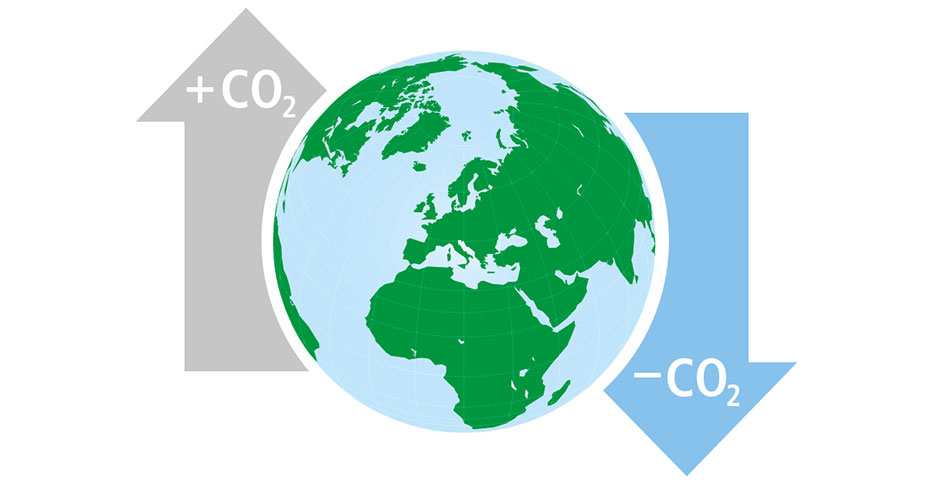Climate compensation – buying our innocence?
Climate compensating as a way of reducing environmental impact is nothing new, and most of us have come across the issue in one way or another. Recently, however, questions have started to be asked about how well the method actually works. Is it just a way of buying innocence? Personally, I think we should all be grateful that the effects of climate compensation are being scrutinised. It should be in everyone’s interest that efforts in this area are actually doing some good. This is our thinking.

CLIMATE COMPENSATION IN BRIEF
The idea behind climate compensation is that companies, organisations and private individuals make a voluntary financial contribution to projects that capture greenhouse gases at a level equivalent to the emissions we cause.
Compensation can also mean that we help to prevent otherwise given emissions from happening in the first place, for example by replacing a coal-fired power plant with a renewable energy source. This funds and enables projects that would not otherwise have been economically viable, and we can contribute to sustainable development in places where it would otherwise have taken longer.
Since the climate issue is a global one, and it’s the sum total of all our joint environmental impact that’s important, it doesn’t really mater where in the world the emissions are taking place and where they’re being prevented or bound. We are all in the same boat. In other words, the binding of greenhouse gases doesn’t have to take place in our own activities, to make a positive contribution in the fight against climate change.
THE WAY WE WORK
From this year, we at FUCHS will compensate for the emissions that we are currently unable to avoid in our production process. This is a global initiative, so it will apply to all production units in the Group.
We will primarily focus on projects related to renewable energy sources, and only projects that are accredited – i.e. approved and monitored in line with international certification standards such as Gold Standard. To ensure that the projects we invest in have a genuine impact, we use independent inspection bodies to verify and monitor each project.
At FUCHS, we feel it is tremendously important that climate compensation is most definitely not about simply buying our innocence. Constantly striving to reduce our own emissions will always be our highest priority, and climate compensation should be viewed as a way of reducing our carbon footprint while we do our best to reduce our own impact. By progressively reducing our company’s carbon footprint, the idea is that we should then be able to reduce our climate compensation over time.
AIMING FOR COMPLETELY CARBON-NEUTRAL PRODUCTS
At FUCHS, we have been consciously working on climate issues globally since 2010, when our sustainability initiative was originally launched. Since then the Group’s CO2 emissions from energy use per tonne of lubricant produced have fallen by around 30%. This is of course a good thing, but we also realise this is only the start of our journey and we have a long way still to go. In the long term, our goal is to be able to offer our customers completely carbon-neutral products, and not just products that are produced with carbon neutrality as we do today. To get to that point, we have some huge challenges to overcome alongside our suppliers, but it certainly feels great to have this as something to work towards.
NEW PRODUCTION PLANT WITH A FOCUS ON SUSTAINABILITY
One big step in our efforts to reduce our environmental impact in the Nordic region is construction of our new production plant outside Stockholm, which is set to come online in August. It gives us brand new opportunities to reduce our climate impact in production.
Among other things we will have our own warehouse stock in the building, thus eliminating transport between production and interim storage. Flows and resources will be streamlined. The entire plant will run on fossil-free energy: electric boilers for heating and cooling the process will run on guaranteed green electricity, under a special agreement with energy company Vattenfall. The building itself is heated and cooled using geothermal energy, and is also prepared for solar panels.
OUR APPROACH
If I had to choose one piece of advice with regard to climate compensation, it would be this: we must think of climate compensation measures as a complement to our own work on sustainability. At FUCHS we try to think in this order: eliminate, reduce, and as a last resort compensate.
Find out more about our sustainability work here.

This might also interest you

Lubricate right and save energy
Energy efficiency goes without saying in many companies – in fact it may even be a government requirement. And smarter lubrication can make a big difference. The right products and routines save energy, while also assuring the technical performance of the machinery.

Waste – an ingredient in future lubricants
Waste could be the key to smarter production and lower environmental impact. That’s because some types of waste can be used to produce lubricants – a new approach that can save both money and the environment.
All blog posts
Subscribe
Only available in Norwegian.
Smart Lubrication
Smart Lubrication is a blog from FUCHS where we share our common knowledge about lubricants and lubrication.
